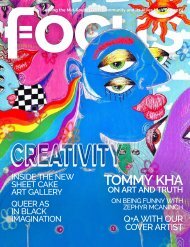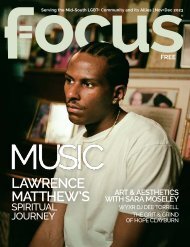Create successful ePaper yourself
Turn your PDF publications into a flip-book with our unique Google optimized e-Paper software.
Faith and the holidays are
inextricably bound together. Yet
the religious traditions that gave
birth to the “holiday season” are
perhaps as difficult to negotiate
as a holiday meal with a
distempered relative. Is there a
“war on Christmas?” Should we
tell our child that Santa Claus is
a fantasy? Should people who
are not Christian put up a tree
and exchange gifts? Do Muslims
have a holiday to celebrate this
time of year? Is Hannukah the
Jewish Christmas? What are
Hindus doing putting up all
those lights? Do Buddhists see
Jesus as a Bodhisattva?
Even starting to ask those
questions is a sure way to get
into hot water. What religious
traditions were not mentioned?
Who gets to speak for what a
religion holds? A quick read of
articles that examine being
Buddhist, or Muslim, or Jewish,
or Hindu, or anything other than
Christian at Christmastime,
reveals the difficulties of
negotiating various religious
traditions in the holiday season.
The flipside to such potential
for controversy is that the faiths
celebrating during “the holidays”
are as delightfully diverse as
“the holidays” themselves. It is
true that in the U.S. the holidays
originated in the celebration of
the Christian feast of Christmas.
Yet the holidays today, at their
best, have expanded to draw in
celebrants from a variety of
faiths and no faith at all.
And here is where we might
want to focus. At the heart of
the holidays, in all of the faiths,
is a wonderful affirmation of
human compassion, of the
goodness of human life, and the
triumph of good over evil and
light over darkness. This heart of
the holidays even plays out in
secular versions that appear in
holiday movies and days off of
work to gather with family and
friends. In this holiday spirit we
can go with the Buddhist monk
Ajahn Chah who said, “Anything
that inspires us to see what is
true and do what is good is
proper practice.”
For those in the Christian
tradition, human compassion,
hope, and the victory of
goodness are grounded in the
celebration of the birth of Jesus.
In Luke’s Gospel, Jesus’ birth is
marked by angels who appear
praising God and proclaiming,
“on earth peace among those
with whom God is pleased.”
Within Judaism, the Feast of
Hannukah celebrates the
rededication of the Second
Temple after the overthrow of
foreign rule. The lighting of the
Menorah commemorates the
miracle of enough lamp oil in
those days of scarcity to keep
the lamp in the Temple lit for
eight days. For Buddhists,
“Bodhi Day” on December 8th
recalls the day of Buddha’s
enlightenment under the Bodhi
tree. The Hindu feast of Diwali is
a festival of lights, and across its
many meanings is a shared
affirmation of the victory of light
over darkness, knowledge over
ignorance, and good over evil.
For Muslims, Eid al-Fitr marks
the end of Ramadan. Renewed
Each faith in its distinctive way
remembers the goodness of life,
of being with each other,
and the responsibility to
be compassionate and seek
the well-being of others.
in their faith through the
practices of Ramadan, Muslims
emerge with refreshed
connection with each other and
with the world, celebrated with
gatherings and good food.
Each faith in their distinctive
ways remembers the goodness
of life, of being with each other,
and the responsibility to be
compassionate and seek the
well-being of others. Each faith
also recalls people to a kind of
humility and shared humanity.
Jesus was born on the margins,
in an obscure corner of the
Roman Empire, to a people
enduring foreign occupation. He
comes, as he says, “to bring
good news to the poor.” The
Menorah was lit as a way for the
Jewish people to once again
affirm their existence against
powerful forces that sought to
extinguish them. The Buddha
emptied of the trappings of
wealth and status came to
enlightenment under the Bodhi
tree. Dwali’s lamps symbolize
the inner light that protects
from spiritual darkness, and
the defeat of those forces that
try to coerce us towards evil.
Eid al-Fitr affirms the
goodness of spending time
with loved ones, of shared
meals, of sharing with the
poor, and gathering for
worship of God.
There is in these religious
traditions, at the heart of the
holidays, a counter-cultural
message that is often lost in
the sea of consumerism that
now surrounds the holiday
season. Joy comes in
attending to our relationships
with family and friends, with
each other, and not in the
acquisition of more and more
things. Love affirms the
goodness of each person in the
midst of our diversities if we are
to live well together. Hope
realistically acknowledges the
difficulties and dangers of
human life, but still affirms life
shared with each other is worth
living. Faith undergirds joy, and
love, and hope. And faith in this
holiday season, affirms that
sorrow, separation, and the
shadows of our lives, may be our
teachers if we listen to the
wisdom that life is stronger than
death, and that light is stronger
than darkness.
During the coronavirus crisis, services are online only at www.churchoftheriver.org


















